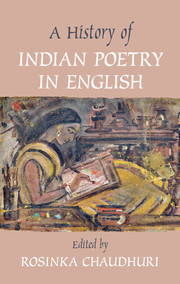Book contents
- Frontmatter
- Contents
- Contributors
- Acknowledgments
- Introduction
- SECTION I THE BROAD NINETEENTH CENTURY: INDIANS IN ENGLISH AND THE ENGLISH IN INDIA
- SECTION II PUBLISHERS, PUBLISHING HOUSES, AND THE PERIODICAL PRESS
- SECTION III POETRY: 1950–2000
- 13 Nissim Ezekiel: Poet of a Minor Literature
- 14 Dom Moraes: A Poet's Progress
- 15 Interpretative Testimony: Kamala Das and Eunice de Souza
- 16 Adil Jussawala and the Double Edge of Poetry
- 17 Arvind Krishna Mehrotra and the Interplay of Languages
- 18 Arun Kolatkar: A Singular Poetry in Two Languages
- 19 Imagery and Imagination in the Poetry of Jayanta Mahapatra
- 20 Modernisms and Modernity: Keki Daruwalla and Gieve Patel
- 21 The Third Generation: Melanie Silgardo and Manohar Shetty
- SECTION IV POETS OF THE DIASPORA
- SECTION V THE NEW MILLENNIUM POETS ON THEMSELVES
- Bibliography
- Index
13 - Nissim Ezekiel: Poet of a Minor Literature
from SECTION III - POETRY: 1950–2000
Published online by Cambridge University Press: 05 March 2016
- Frontmatter
- Contents
- Contributors
- Acknowledgments
- Introduction
- SECTION I THE BROAD NINETEENTH CENTURY: INDIANS IN ENGLISH AND THE ENGLISH IN INDIA
- SECTION II PUBLISHERS, PUBLISHING HOUSES, AND THE PERIODICAL PRESS
- SECTION III POETRY: 1950–2000
- 13 Nissim Ezekiel: Poet of a Minor Literature
- 14 Dom Moraes: A Poet's Progress
- 15 Interpretative Testimony: Kamala Das and Eunice de Souza
- 16 Adil Jussawala and the Double Edge of Poetry
- 17 Arvind Krishna Mehrotra and the Interplay of Languages
- 18 Arun Kolatkar: A Singular Poetry in Two Languages
- 19 Imagery and Imagination in the Poetry of Jayanta Mahapatra
- 20 Modernisms and Modernity: Keki Daruwalla and Gieve Patel
- 21 The Third Generation: Melanie Silgardo and Manohar Shetty
- SECTION IV POETS OF THE DIASPORA
- SECTION V THE NEW MILLENNIUM POETS ON THEMSELVES
- Bibliography
- Index
Summary
It might be best to begin by explaining what I understand by the word “minor.” The word is out of serious use, since the value-judgment implicit in the dichotomy of “major” and “minor” has long been out of favor. Better, usually, to speak of “minority,” a term with political resonances that many can work with. And yet to approach the provenances of Nissim Ezekiel's work, we probably need to go back to those value-judgments and enquire into how they affected, and were even appropriated by, Ezekiel, and rewritten as a particular aesthetic.
How conventional literary history or criticism decides who is a major or a minor poet depends partly on subjective assessment and partly, as present-day wisdom would say, on culture-specific biases. But let's second-guess what the assumptions of “being major” are. A major poet appears to be a practitioner who's crucially related to an epoch and to the zeitgeist, and our vocabulary formulates this relationship in a number of ways: that the major poet embodies the zeitgeist; that he or she actively contributes to shaping it; that he or she subverts or transgresses it; that the major poet occasionally remains unrecognized in the epoch they live in and anticipates a zeitgeist that's to come. The minor poet performs none of these tasks; he's not to be confused with being a bad poet – instead, he's one who is, in a sense, solely an aesthetic or literary figure, a faithful, competent, even accomplished adherent of the literary rulebook of his age, a practitioner who's content to be a producer of good poems. The minor poet doesn't aim – it would seem – to question the literary (or the assumptions surrounding it in the time he lives in) or put it to test. As a result he doesn't engender an oeuvre but writes good poems – at most, her or his oeuvre might be an agglomeration of individual good poems. The minor poet's oeuvre is not – unlike the major poet's – a mini-tradition or a parody of a lineage, a competitor with or a version of literary history and tradition itself.
- Type
- Chapter
- Information
- A History of Indian Poetry in English , pp. 205 - 222Publisher: Cambridge University PressPrint publication year: 2016

